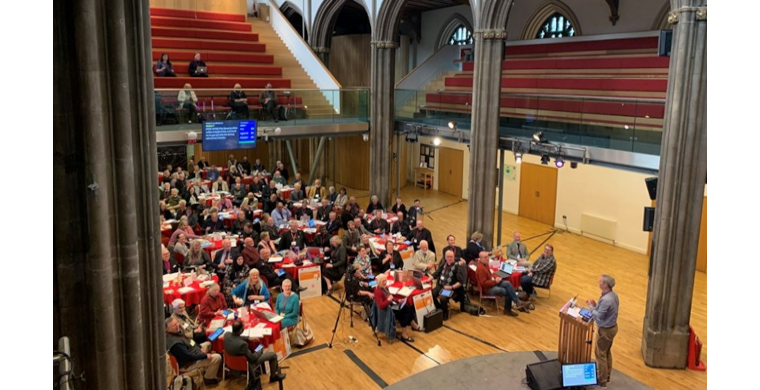SCOTTISH PRIMUS ASKS FOR PATIENCE AS DYER CRISIS DRAGS ON
Statement given on continued suspension of the Bishop of Aberdeen & Orkney
PHOTO: Members of the General Synod of the Scottish Episcopal Church gathered in St Paul's and St George's, Edinburgh, on Thursday.
By Francis Martin
THE CHURCH TIMES
June 9, 2023
THE General Synod of the Scottish Episcopal Church (SEC) opened on Thursday on a sombre note, as the Primus, the Most Revd Mark Strange, read out a pastoral statement about the continued suspension of the Bishop of Aberdeen & Orkney, the Rt Revd Anne Dyer (News, 3 October 2022).
Speaking at noon, Bishop Strange opened the first session of this year's Synod by saying that the situation was "a source of concern and sadness. Over the course of the summer and autumn last year, formal accusations were received under Canon 54, the Church's clergy-discipline canon, and Bishop Anne was suspended."
Bishop Dyer was Scotland's first woman bishop, elected by the College of Bishops after the diocese failed to agree a candidate (News, 11 November 2017; 5 January 2018). She was first suspended in August last year after two formal complaints of misconduct, understood to relate to accusations of bullying, but appealed against the decision and was almost immediately reinstated (News, 10 August 2022).
Two months later, the Episcopal Synod rejected her appeal and the suspension was reinstated.
Allegations about Bishop Dyer's conduct first came to light in October 2020, after the trustees of St Andrew's Cathedral, Aberdeen, commissioned a review of a dispute concerning the director of music. A second review was commissioned the following year, this time by the Primus, after allegations of bullying were made by the Rector of the cathedral, Dr Isaac Poobalan (News, 6 March 2021).
Bishop Dyer's lawyers have said on her behalf that "an entirely one-sided and self-serving picture has been presented by a handful of people who fundamentally object to same-sex marriage and to Bishop Dyer's appointment as the Diocese's first female bishop. . . She is clearly frustrated at being unable to respond publicly to the very personal and gruelling attacks on her" (News, 14 October 2022).
The Primus explained on Thursday: "Accusations under Canon 54 are sent to the Preliminary Procedures Committee as a first stage in the canonical process. The Preliminary Proceedings Committee is independent to the College of Bishops. The committee has been working hard to discharge its responsibilities, in the context of a process which inevitably takes time to complete, and I would like to express thanks to its members for the attention they've been devoting to the matter.
"Since a formal process is under way, you will understand that I'm not able to provide detailed comment nor am I able to respond to questions on this subject. However, I would like to ask you to join with the College of Bishops in continuing to pray earnestly for all those involved and for a fair and just resolution, and to respect the confidentiality and sensitivity of the ongoing process in all we say and do over the next three days. The offer of pastoral support has been made to those involved. We must keep praying."
Bishop Strange also thanked the Bishop of Edinburgh, Dr John Armes, who has been serving as the Acting Bishop of Aberdeen & Orkney.
Synod representatives from the diocese, who preferred to remain anonymous, expressed frustration at the lack of any timeframe for the process, and the difficulties that this created in planning the way forward. The Primus' pastoral statement amounted to saying "no comment", they suggested.
"We're surviving," Dr Armes told the Church Times on Friday, and paid tribute to staff and church members across the two dioceses for helping to make the situation work.
The disciplinary process was "going on longer than expected", he admitted, and that the current situation is "not what anyone wants".
Dr Armes's episcopal seat in Edinburgh is 300 miles from Lerwick in Shetland, the northernmost point of the diocese for which he is acting bishop, and it takes at least a full day to make the journey.
The burden of performing episcopal duties in the diocese has been eased by the presence of the former Bishop of Pittsburgh in the United States, the Rt Revd Dorsey McConnell, who has retired to Orkney, and in May last year was commissioned as an Assistant Bishop in the diocese.
In two weeks' time he will travel to Lerwick, in Shetland, to conduct a confirmation, has been asked to convene the mission and ministry board in the diocese.
"It's pretty much a case of 'not sure what's happening here, can you do this?' sort of ministry," he joked on Friday.
Bishop McConnell has experience of diocesan disruption. He was the first permanent Bishop of Pittsburgh after the schism in the US which gave birth to the breakaway Anglican Church in North America (ACNA), of which his predecessor in Pittsburgh, the Rt Revd Robert Duncan, became the first archbishop.
"I'm used to the territory of a place where people have been broken, and that certainly describes what the situation is in Aberdeen & Orkney. As the Primus said yesterday, there is a lot of pain all around," he said.
He expressed hope he could "be there as a pastoral presence" and to "help folks move towards a reconciliation".
A proposal to change the rules about how a bishop is appointed when the diocese cannot agree a candidate will be voted on at this year's Synod, after it passed its first reading last year, albeit not with the two-thirds-majority that will be required for final approval (News, 17 June 2022).
END














